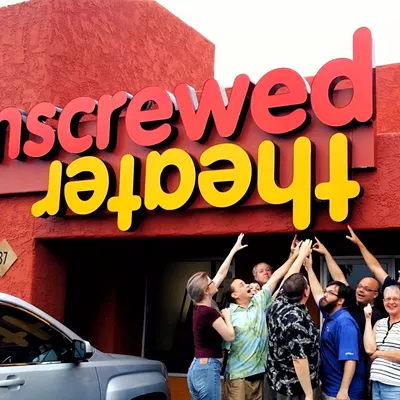Everyone likes to have a way to blow off steam. And depending on your interests (as well as how healthy your respect is for the law), there are plenty of ways to do so.
But punching a heavy bag or taking spinning classes isn't for everyone. Sometimes, you need something a little more ... interactive and combative.
It's one of the main draws of the Tucson Roller Derby league, which for more than a decade has provided an outlet for local women to participate in a contact sport that combines athletic ability with the chance to knock people to the ground.
But as with any sport, the number of participants is fluid, based on availability and health, especially in an endeavor that involves helmets, knee and elbow pads and constant movement on wheels.
"We have about 50 members right now," said Ema Sculator, TRD's "newbie" liaison. "Participation continues to go up, but we're constantly in need of more skaters as (some) retire and others move. We liked to call them fresh meat."
The 11th season of Tucson Roller Derby is about to get going, with the Tucson Saddletramps set to face the Phoenix Tent City Terrors at 6:30 p.m., Saturday, Jan. 18, at The Wreckhouse, a converted warehouse at 1145 E. Valencia Road.
Matches are also scheduled in Flagstaff, Phoenix and Prescott, and the league's annual Dust Devil tournament is scheduled for early April.
But before the next season begins, TRD is hosting an orientation meeting at 7 p.m., Monday, Jan. 13 for anyone interested in joining the ranks. Following that is a 12-week "fresh meat" program that trains new skaters in the ins and outs of roller derby, with those who complete the training joining one of TRD's five teams: travel squads Saddletramps and Bandoleras, and in-town units Furious Truck Stop Waitresses, Vice Squad and Copper Queens.
Sculator said she stumbled upon roller derby a year and a half ago, and since then has served as the nonprofit group's question-and-answer person for newcomers. TRD has held three previous newbie training programs, but this will be the first time for an orientation class beforehand.
"It's going to be an informal meeting, because there's a lot to go over," Sculator said. "There's a lot of expense that can go into doing roller derby, and a lot of time involved. The meeting is to explain that, if you're going to do it, you should buy these knee pads, not those knee pads. And you should know you'll probably need to devote 10 hours a month to volunteering."
Skaters all take on a competition name, such as Ema Sculator, which she calls an "alter ego" that in a way masks one's off-the-rink personality and lifestyle. Sculator, a 33-year-old veterinarian, also goes by Katie when not on the rink.
"This is the most profound group of women I've ever been around," Sculator said. "There are lawyers and quite a few schoolteachers. It's just a really empowered, strong group of women. The sport has really changed. It's much more athletic-based. It's not the old school where people are punching people and throwing chairs."
The orientation is free, while the training course costs $65, which covers team dues for three months as well as coaching and some insurance costs.
Tucson Roller Derby is insured through the Women's Flat Track Derby Association, though skaters are required to have their own personal health insurance.
"No, it doesn't fit under Obamacare," Sculator said. "I've seen girls break their legs and separate their shoulders."










